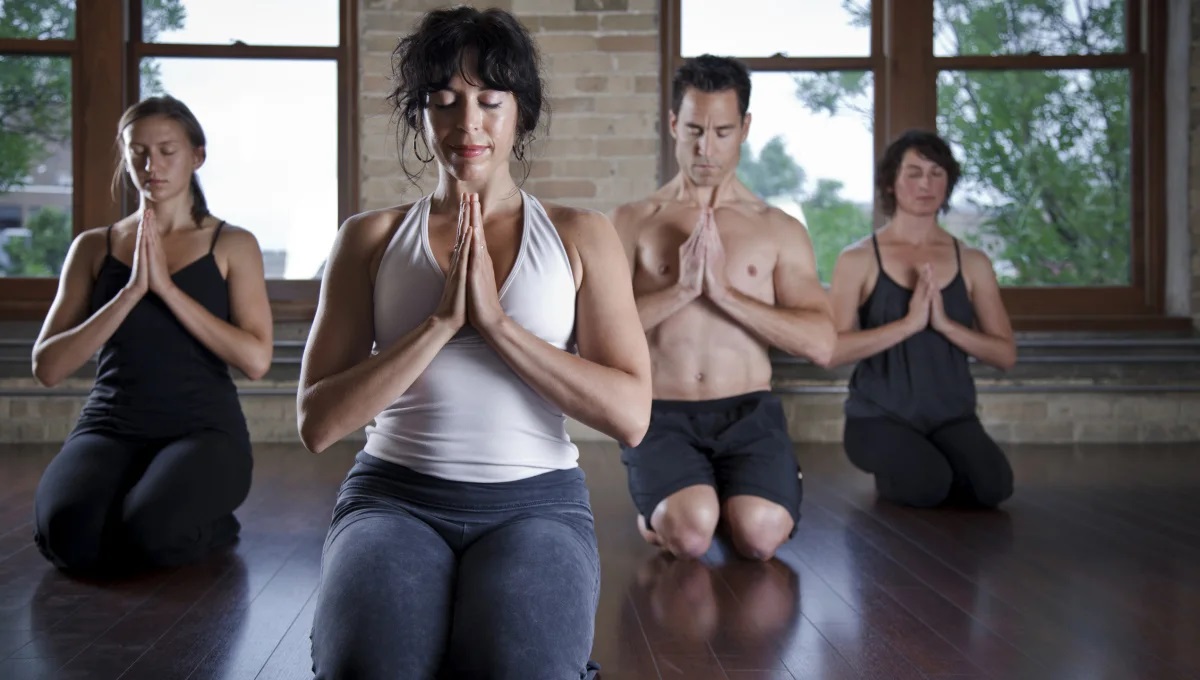
Hot Yoga: Healing or Hazardous?
Summer might be wrapping up, but where I live, the heat is still in full force. So it’s hard to imagine choosing to spend my yoga class in a hot oven of a room instead of an air-conditioned studio. But given the growing popularity of Bikram and other hot yoga classes, it’s obvious that plenty of yoga enthusiasts think differently. To try to understand the allure (and find out if all that sweating is really safe), I checked in with yoga instructor and NASM Elite Trainer Michelle Carlson.
First things first: Let’s get the Bikram vs. hot yoga confusion out of the way. Both take place in a room heated to between 105 and 108 degrees, says Carlson, and both are built around a lot of physically demanding poses. But in Bikram, named for creator Bikram Choudhury, you do the same set of 27 postures each time. Hot yoga, on the other hand, is much more free-form.
Why brave the heat?
Carlson is a certified hot yoga yogini—and talking to her, it’s obvious why she goes to the trouble of driving 45 minutes to get to her favorite studio. “You know that awesome feeling of accomplishment you get after a great cardio workout? It feels like that, only more centered and grounded,” she says. “It’s a feeling close to elation.”
There are other reasons to brave the sauna-like atmosphere of a hot yoga class, says Carlson. The many twisting poses act as a sort of cleansing massage for your internal organs, and doing it regularly can help you lose weight, thanks to the physical demands of the poses and the increased body awareness that comes along with virtually any yoga practice.
A hot controversy
Still, there are reasons hot yoga has drawn some fire. Carlson acknowledges there are drawbacks to sweating your way through your asanas—and that it’s definitely not for everyone. “When your muscles get really warm, you can stretch farther,” she says. That might sound like a good thing, but it’s easy to overstretch your tendons and ligaments when they’re so loose and forgiving, landing you squarely on the sidelines.
Another risk is dehydration. All that sweating can leave your body dangerously parched if you don’t make a point of drinking water before, during and after class. But don’t pair your pre-yoga sips with a snack. “With hot yoga, the effect of what and how you eat is magnified,” says Carlson. “You maneuver your internal organs so much with the twists that it can affect your digestion.” Eat too close to class and your tummy will be begging for mercy.
Even if you’re mindful of how far you stretch and how much you eat and drink, hot yoga still may not be for you. “Some people are more sensitive to heat than others,” says Carlson. “They just can’t do it and their bodies start to shut down. If you’re someone who can’t stand summer, it’s not for you.” And it’s definitely not for you if you’re pregnant, have high blood pressure or have heart issues.
If you do decide to give hot yoga a try, look for an instructor certified by the Yoga Alliance to teach hot yoga, Carlson says. (Check for certification from Bikram’s Yoga College if you opt for Bikram.) In such a challenging environment, you want someone watching over you who knows what she’s doing.
And if you feel like reserving your sweat-fests for those hot summer days? Well that’s cool, too.







